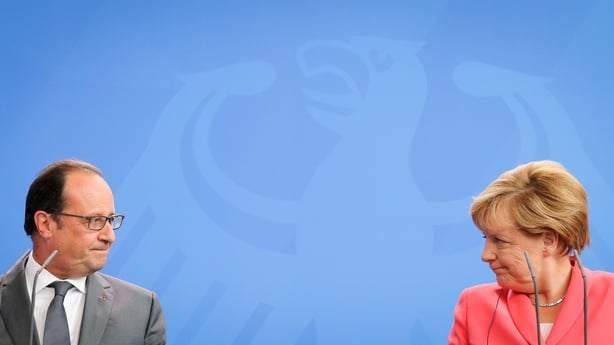German Chancellor Angela Merkel and French President Francois Hollande have called for a "unified" response to the worst refugee crisis to hit the EU since World War II.
In a brief statement ahead of talks on quotas for accepting migrants, Mr Hollande said: "We must put in place a unified system for the right to asylum."
Ms Merkel, whose country expects a record 800,000 asylum applications this year, said Germany and France also expected all EU members to conform with existing refugee policies governing the bloc "as quickly as possible."
The German leader said she and the French president were also in agreement that the EU must draw up a "unified" list of safe countries of origin to which asylum-seekers arriving in the bloc would be quickly returned.
Germany has been pushing for such a policy given the large portion of its asylum-seekers - 40% - are coming from the Balkans.
Berlin argues that to help those from war zones such as Syria, Iraq and some regions of Africa, it needs to be able to filter out "economic migrants" more quickly.
Ms Merkel reiterated that registration centres must be set up at the first ports of call in Greece and Italy to be administered and staffed by the EU as a whole by the end of the year.
"We cannot tolerate a delay," she said.
Mr Hollande underlined France's "solidarity" with Germany in calling for a "fair distribution of asylum-seekers" within Europe, as well as "the dignified return of people entering illegally".
He said: "There are moments in European history in which we face an exceptional situation - today, it is an exceptional situation but an exceptional situation that will last for some time."

Earlier more than 5,000 migrants have crossed into Serbia, resuming a journey to western Europe after an overwhelmed Macedonia gave up its attempts to stem the flow of mainly Syrian refugees by force.
Macedonian officials laid on buses and trains to carry them north after days of havoc caused by the closure of its southern frontier by security forces, who used stun grenades and tear gas in an attempt to keep them out.
The flow was unabated, as Greece ferried refugees from inundated islands to the mainland.
A record 50,000 hit Greece by boat from Turkey in July alone, bringing ripples of Middle Eastern conflicts to Europe's shores.
The International Organisation for Migration (IOM) has said there needs to be a European solution to address the current crisis.
Speaking on the RTÉ News at One, Leonard Doyle from the IOM said there is an issue with governments threatening to close their borders and build fences.
"Europe is a project that is built on human rights in its fundamentals. We cannot discriminate against migrants or refugees based on religion," he said.
"The protection has to be afforded to those in need of protection and not to check whether they are card carrying Catholics."
Serbian Defence Minister Bratislav Gasic, visiting a migrant reception centre on Serbia's southern border with Macedonia, said more than 5,000 people had entered overnight as Macedonia cleared the backlog.
Huge queues formed as migrants from the Middle East, Africa and Asia waited for papers to legalise their transit north through Serbia, before they cross by foot into Hungary and Europe's borderless Schengen zone.
Many had slept in the open on the Greek-Macedonian border with little access to food or water.
"We expect the wave in the next day or two to be of a similar intensity," Mr Gasic was quoted as saying by the Serbianstate news agency, Tanjug.
"Police are working in three shifts, papers are being issued around the clock."
People smugglers have thrived this summer on a surge of people fleeing war and poverty which has overwhelmed authorities from the Greek islands to the French port of Calais.
Many undertake dangerous journeys across sea and then cross southern Europe in order to reach wealthier nations such as Germany, where officials expect a record 750,000 asylum-seekers to arrive this year.
In Greece, a car ferry carrying 2,466 migrants from Greek islands, most of them fleeing Syria, docked in Athens yesterday morning. It left again two hours later to pick up more. Almost all will head to Macedonia.
Serbia appeared better equipped than Macedonia to handle the surge in numbers, having recently opened a reception centre in the southern town of Presevo.
Macedonia declared a state of emergency on Thursday and sealed its southern frontier to migrants pouring in at a rate of 2,000 per day.
The numbers had overwhelmed the main border railway station and the conservative government, which has a tense relationship with Greece, said enough was enough.

